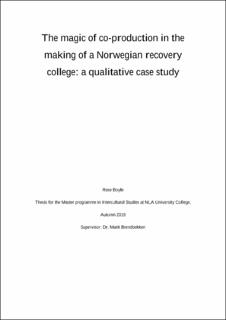| dc.description.abstract | Background. This thesis is a qualitative case study of a recovery college project in a Norwegian municipality and places itself within the field of intercultural studies and particularly within the area of intercultural health. Recovery colleges’ aim is to facilitate recovery among students living with mental health and/or substance dependence issues, by bringing a diversity of competencies (‘by education’ and ‘by experience’) into interplay within the same organizational space, seeing them as complementing each other. Previously held ideas of effective recovery and social integration are changing due to the recovery movement and philosophies that prioritise holistic wellbeing and personal and social recovery and empowerment. Those traditionally perceived as service users are increasingly recognised as of being equally and uniquely competent to judge and steer their own recovery journeys relative to educated health professionals who have usually held the power and authority in organisational and institutional settings. This power vested via broader societal structures, positions and related ‘competencies,’ is challenged by co-production methods. Co-production is understood as the ‘magic’ ingredient which makes the recovery college special and is viewed as a key for introducing societal and systemic change.
Objective. I explore the recovery college settings through the dynamics of agency and structure, with emphasis on the diversity of competencies in co-production, as an equalizing tool for recovery-oriented working. I am interested in the rationale behind the recommendations of and employment of co-production in the services, the impact of co production on recovery-orientation and what recovery is considered to imply among the parties involved, not least how the parties approach these issues. Moreover, I explore how their interactions and conversations in these respects reflect prior experiences, positionality and discourses central to our times, such as the issue of integration in overall society, ethnic and cultural diversity, Norwegian ideals concerning cultural “sameness,” how competencies are valued, and stigma processes.
Design. The case study design uses data collected through personal interviews, participant observation and co-production as in participatory action research. In total, 26 participants with diverse competencies and backgrounds who were involved variably in the development of the Bugard recovery college project were interviewed in either formal or informal interview settings. Data from the project pilot via feedback from the first run of students is also analysed.
Result. Co-production processes and interactions between individuals in these settings are seen to be affected and influenced by a variety of factors. The innovative and radical nature of co-production has been for the most part experienced as positive by those involved in project development and by the students in the pilot. I identify that one agenda behind the employment of co-production in the services is to redirect a potential insular orientation among persons with mental health and/or substance dependence backgrounds towards societal integration and active citizenship. Likewise, I identify a desire to create shared understandings and values and facilitate partnerships across asymmetrical relationships and otherwise differently positioned actors in the health sector. I find that although co-production is considered an equalizing tool, there still exists wider cultural discourses around stigma in mental health and societal integration, structural hierarchies and diverging ideas around the college’s central ideologies of recovery and differences in decision-making power and authority between ‘experts by experience’ and ‘experts by education’. These factors have a rich context outside of the co production space and have all been seen to influence the recovery college environment, and have had a measurable influence on both the experience of co-production for various parties and the types of ‘products’ or content produced throughout the development the recovery college project. | |
